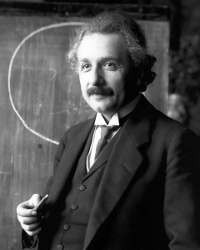

Albert Einstein is one of the most famous persons of the twentieth century, and is widely considered to be the father of modern physics. With his brilliant, fertile mind, his ability to think outside of the box
(years before this phrase existed), and his sometimces disheveled appearance, he has become the iconic symbol of the scientific genius. Einstein is best known for his special and general theories of relativity, which revolutionized physics by supplanting the Newtonian model of the universe. The list of physics subjects and problems associated with Einstein is vast: the photoelectric effect, mass-energy equivalence, Einstein field equations, quantum theory, wave-particle duality, to name a few.
As a political and social figure, Einstein's contributions are also enormous. In August 1939, he wrote to then US Pesident Franklin Roosevelt warning that Nazi Germany might be developing an atomic weapon. This led to the US Manhattan project and the development of the atomic bomb by the US. This is not what Einstein wanted, of course. He was strongly opposed to nuclear weapons, and as a pacifist, to war generally.
To students of probability Einstein is rememberd for several important contributions. In 1905, often referred to as as Einstein's miracle year, he gave a physical explanation for Brownian motion, the eratic motion of small particles suspended in a fluid, which was first observed by the Scottish botanist Robert Brown. Using thermodynamics and kinetic theory, Einstein explained the phenomenon in terms in terms of the particle being jostled by molecules of the fluid. Doing so, he helped firmly establish the atomic theory of matter, which was still not universally accepted in 1905. In 1924, Einstein extended a statistical model, first devloped by the Indian physicist Satyendra Nath Bose, that treats particles (such as certain elementray particles) as indistinguishable objects. This model is now known as Bose-Einstein statistics in their honor, and is in sharp contrast to the probability models that apply to macroscopic objects just as balls and dice, that behave as distinguisable objects.
On the other hand, Einstein is also remembered for his skepticism about the fundamental role of probability in nature. This skpeticism is evidenced by his quote The theory says a lot, but does not really bring us any closer to the secret of the 'old one'. I, at any rate, am convinced that He does not throw dice.
which is famously, if incorrectly, abbreviated to God does not play dice with the universe
.